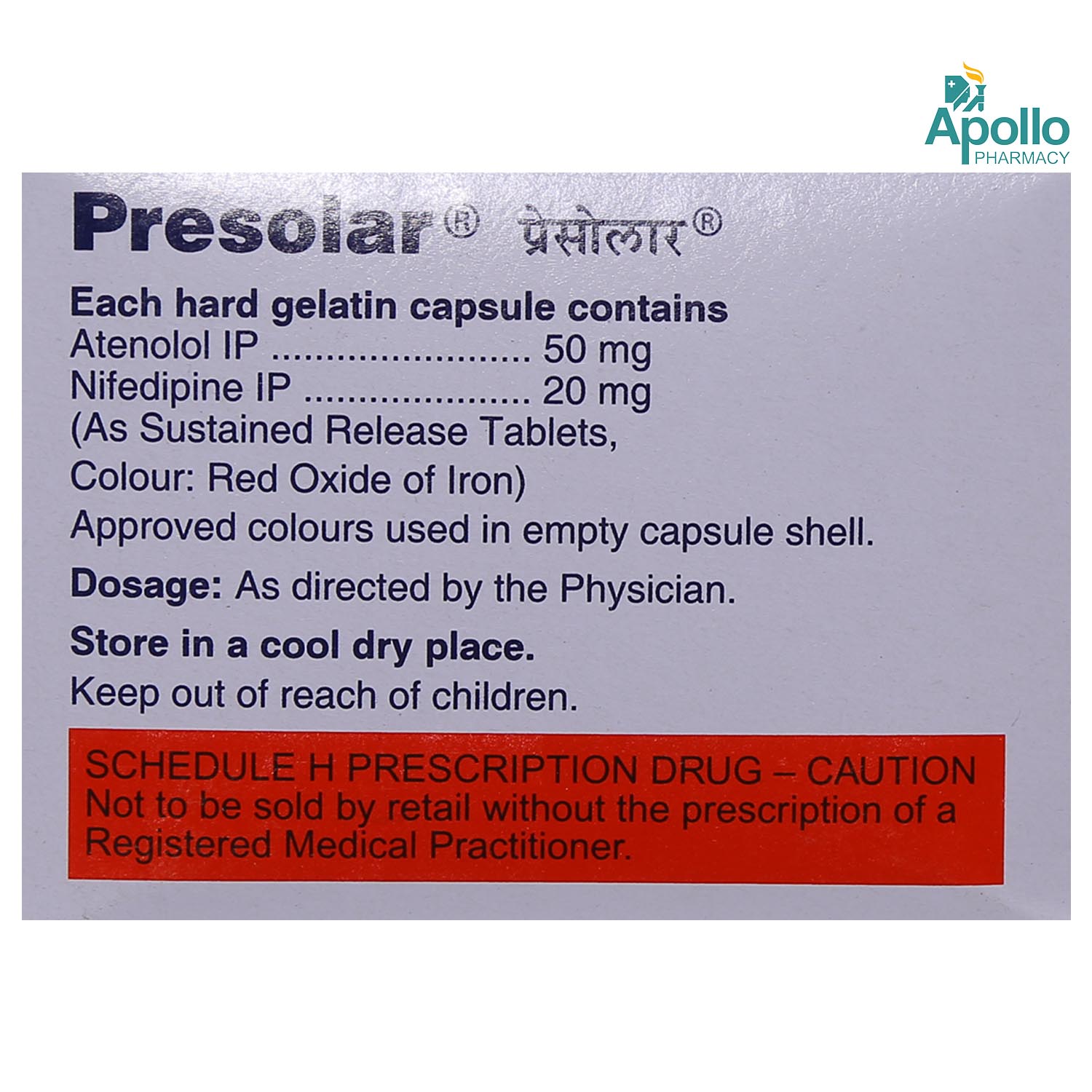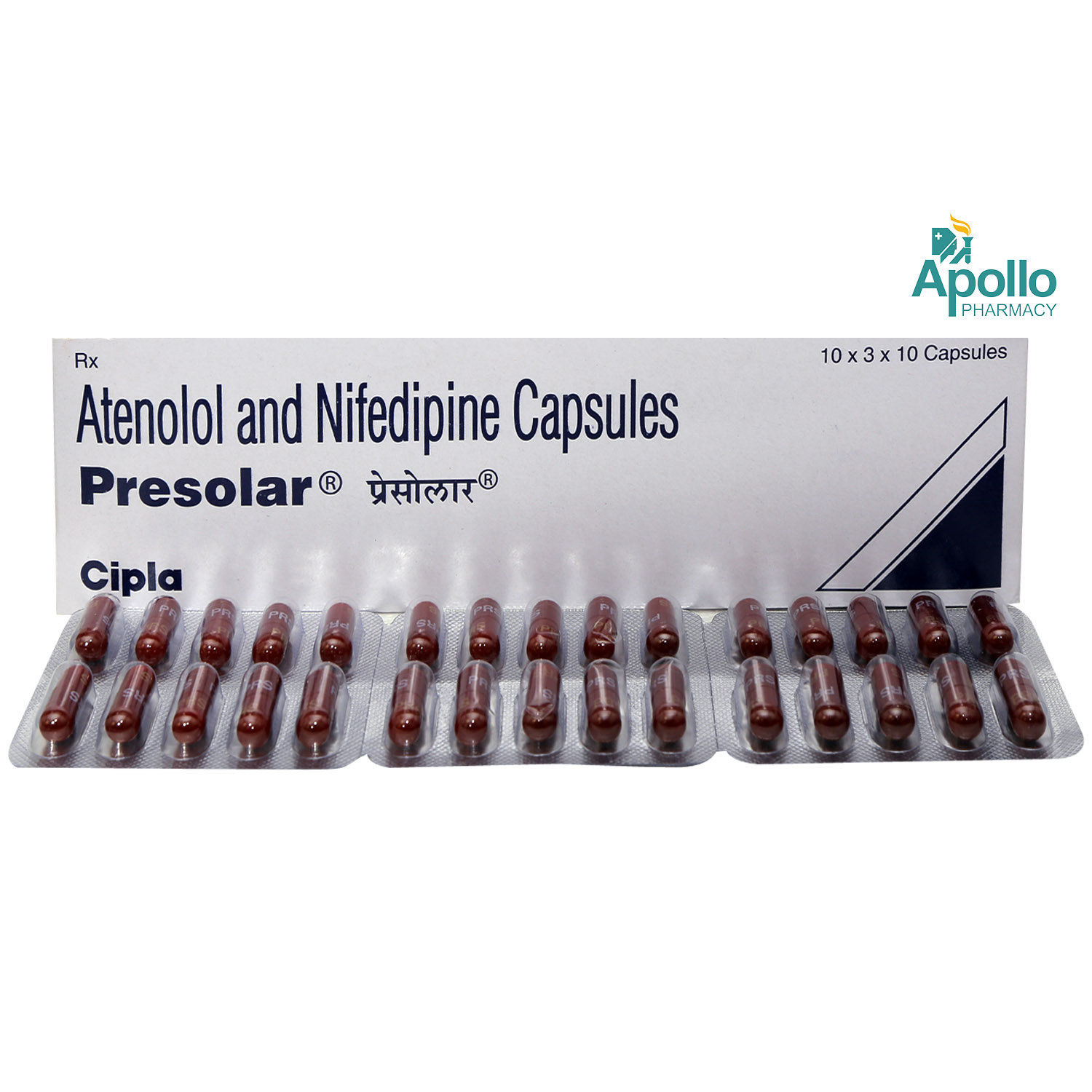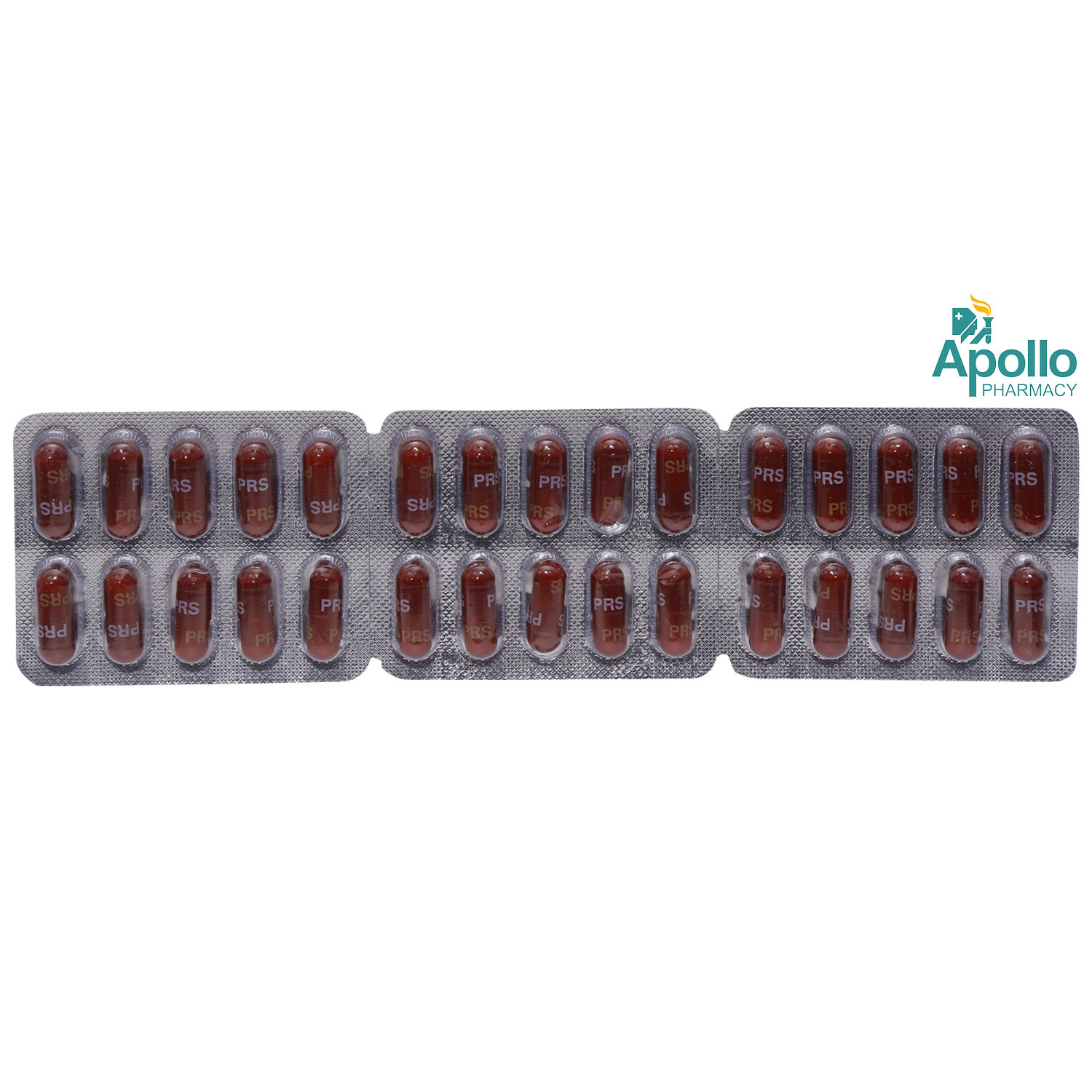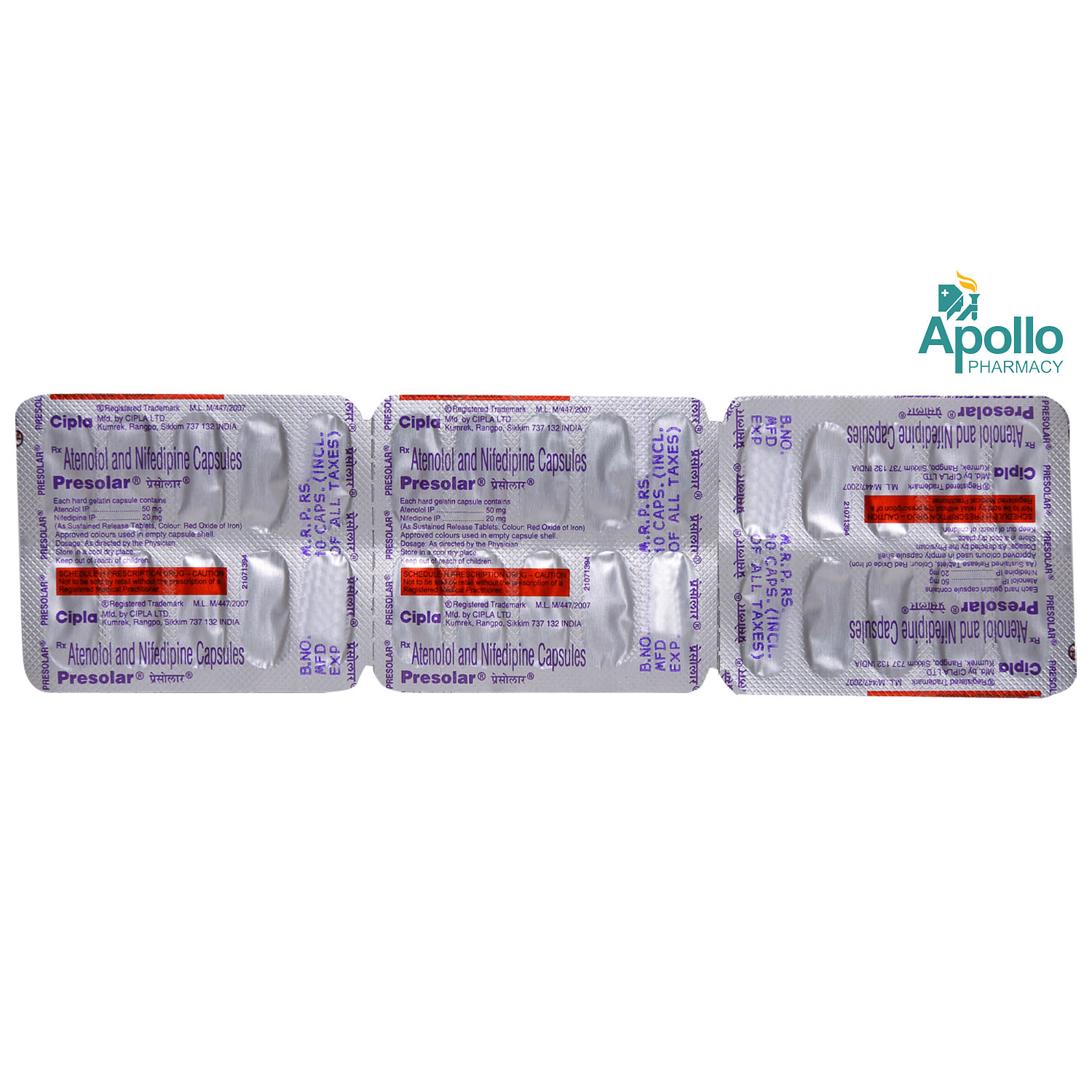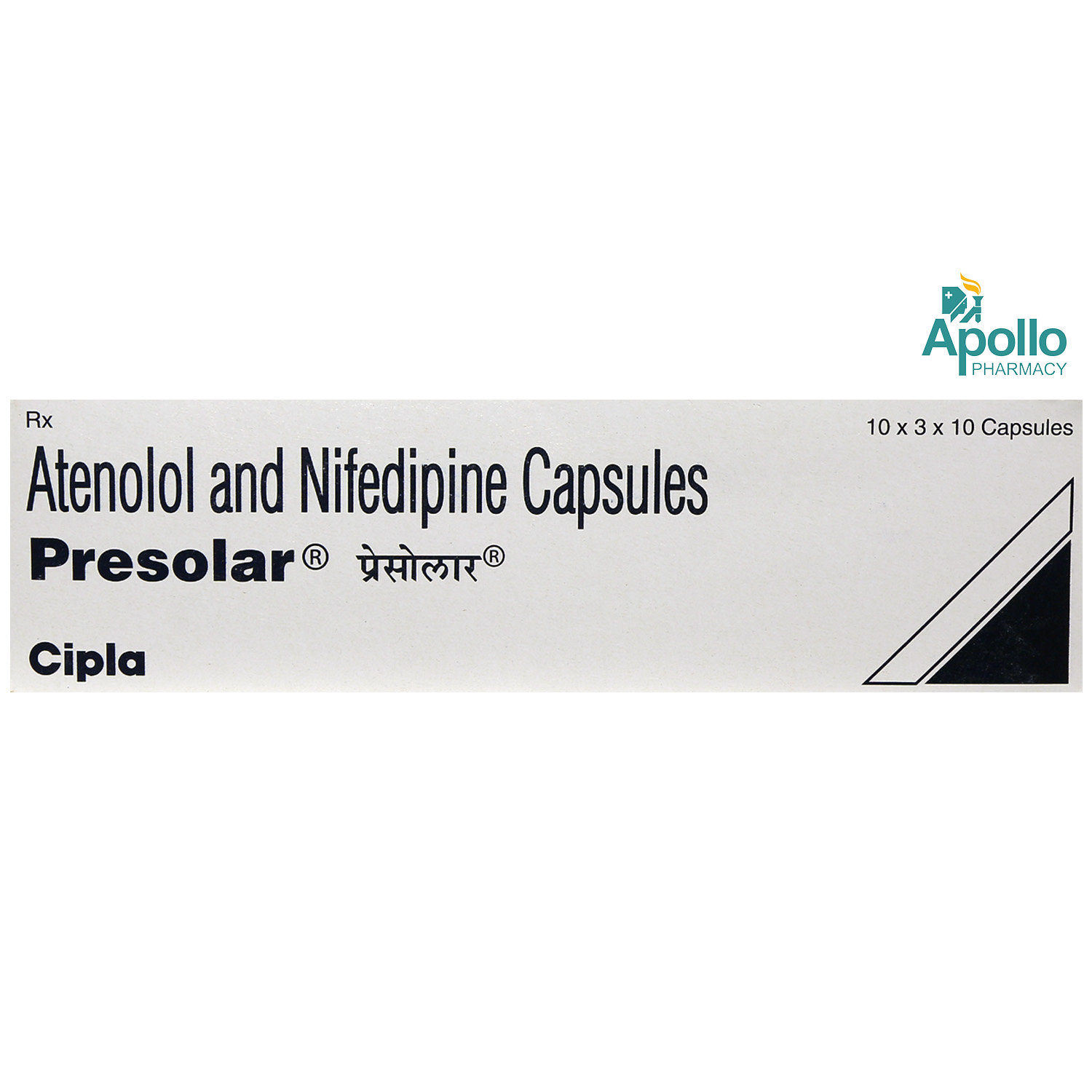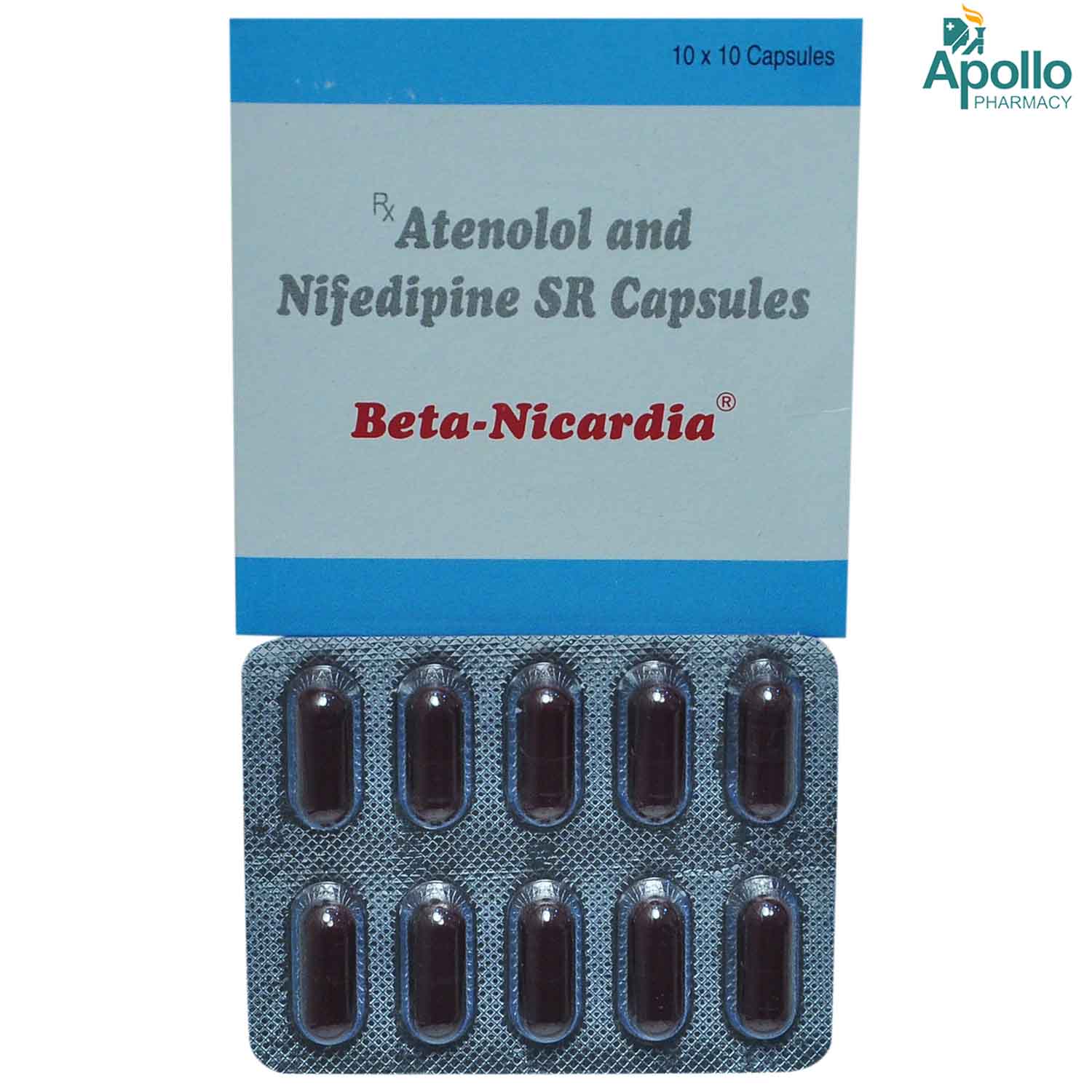Presolar Capsule 10's
MRP ₹55
(Inclusive of all Taxes)
₹6.6 Cashback (12%)
Provide Delivery Location
Online payment accepted
 Prescription drug
Prescription drugWhats That
Composition :
Manufacturer/Marketer :
Consume Type :
Expires on or after :
Return Policy :
About Presolar Capsule
Presolar Capsule belongs to the class of combination medication called 'anti-hypertensive drugs,' primarily used to treat hypertension (high blood pressure). Hypertension is a medical condition in which the blood exerts high pressure (force exerted by circulating blood) against blood vessels' walls. This condition makes the heart work harder in pumping blood to the whole body. Hypertension can cause severe health complications, including stroke, heart failure, heart attack, and kidney failure.
Presolar Capsule contains Atenolol (beta-blocker) and Nifedipine (calcium channel blocker). Atenolol works by reducing the heart rate and makes the heart pump blood efficiently throughout the body. Nifedipine works by relaxing the blood vessels; this lowers your blood pressure and reduces your risk of having a stroke, a heart attack, other heart problems, or kidney problems in the future. This medicine needs to be taken regularly to be effective and also for the best results.
Take Presolar Capsule as prescribed by your doctor. You are advised to take Presolar Capsule for as long as your doctor has prescribed it for you, depending upon your medical condition. In some cases, you may experience blurred vision, sweating, tiredness, dehydration, constipation, dizziness, headache, nausea, cold hands or feet, and muscle cramps. Most of these side effects of Presolar Capsule do not require medical attention and gradually resolve over time. However, if the side effects are persistent, reach out to your doctor.
Do not stop taking Presolar Capsule without consulting your doctor since it may worsen your condition and increase the risk of future heart problems. Inform your doctor if you are suffering from kidney, liver, heart diseases, diabetes, gout, and asthma. Please tell your doctor if you are taking any other medicines or have any allergic reactions to Presolar Capsule . Reducing the amount of table salt (sodium chloride) in your food often relieves the body's swelling. Do not eat grapefruit or drink grapefruit juice while you're taking Presolar Capsule . It can make side effects worse. If you are pregnant or breastfeeding, please tell your doctor so that the dosage of Presolar Capsule can be prescribed accordingly.
Uses of Presolar Capsule
Directions for Use
Key Benefits
Presolar Capsule treats hypertension (high blood pressure), consisting of Atenolol (beta-blocker) and Nifedipine (calcium channel blocker). Atenolol works by blocking the release of stress hormones (like adrenaline or non-adrenaline), thereby relieving angina (chest pain) and uneven heartbeats (arrhythmias). Atenolol also protects the heart during the treatment of a heart attack. Nifedipine works by relaxing the blood vessels; this lowers your blood pressure and reduces your risk of having a stroke, a heart attack, other heart problems, or kidney problems in the future. This medicine needs to be taken regularly to be effective and also for the best results. Thus, Presolar Capsule reduces raised blood pressure by minimizing fluid overload (oedema) and reducing the heart's blood-pumping activity.
Storage
- Hydrate your body: Drink enough water to prevent dehydration and headaches.
- Calm Your Mind: Deep breathing and meditation can help you relax and relieve stress.
- Rest and Recharge: Sleep for 7-8 hours to reduce headache triggers.
- Take rest: lie down in a quiet, dark environment.
- Cold or warm compresses can help reduce tension.
- Stay Upright: Maintain good posture to keep symptoms from getting worse.
- To treat headaches naturally, try acupuncture or massage therapy.
- Over-the-counter pain relievers include acetaminophen and ibuprofen.
- Prescription Assistance: Speak with your doctor about more substantial drug alternatives.
- Severe Headaches: Seek emergency medical assistance for sudden, severe headaches.
- Frequent Headaches: If you get reoccurring headaches, consult your doctor.
- Headaches with Symptoms: Seek medical attention if your headaches include fever, disorientation, or weakness.
- Exercising regularly helps lower the risk of heart problems.
- Maintain a healthy diet, including vegetables and fruits.
- Rest well; get enough sleep.
- Manage stress with yoga and meditation.
- Limit alcohol and smoking.
- Consult your doctor if you experience skin redness, itching, or irritation after taking medication.
- Your doctor may adjust your treatment plan by changing your medication or providing guidance on managing your erythema symptoms.
- Your doctor may recommend or prescribe certain medications to help alleviate symptoms.
- Apply cool compresses or calamine lotion to the affected skin area to reduce redness and itching.
- Stay hydrated by drinking plenty of water to help alleviate symptoms and keep your skin hydrated.
- Monitor your skin condition closely and promptly report any changes, worsening symptoms, or concerns to your healthcare provider.
- Eat slowly and chew your food well to avoid swallowing air, which can make stomach pain worse.
- Instead of going long periods without eating, try having smaller meals or snacks throughout the day to stop too much stomach acid from building up and causing pain.
- Stay away from fatty, fried, or spicy foods. Instead, eat more healthy, fibre-rich foods.
- Drink plenty of water to help with digestion and avoid soda or alcohol, which can make stomach pain worse.
- Try to manage stress with relaxation techniques, and see a doctor if stress leads to chronic stomach pain.
- Try antacids or medications like proton pump inhibitors to protect your stomach.
- Inform your doctor about your constipation symptoms. They may adjust your medication or advise alternative treatments.
- Stay hydrated by drinking sufficient of water (at least 8-10 glasses a day) to help soften stool and promote bowel movements.
- Increase fibre intake by eating foods high in fibre, such as fruits, whole grains, vegetables and legumes, to help bulk up the stool.
- Establish a bowel routine by trying to go to the bathroom at the same time each day to train your bowels.
- Engaging in regular exercise, like walking or yoga, can support in bowel movement stimulation.
- Consult your doctor if constipation persists, and discuss alternative treatments or adjustments to your medication.
- Restlessness is related to mental health and needs medical attention if it's severe.
- Regular practice of meditation and yoga can help calm your mind. This can reduce restlessness.
- Prevent smoking as it can impact your calmness of body and mind.
- Talk to your friends and family about restlessness, who can provide a solution for why you feel restless.
- Get sufficient sleep for a minimum of 6-7 hours to reduce restlessness.
Drug Warnings
Do not use Presolar Capsule if you are allergic to Presolar Capsule or any of its components. Let your doctor know if you have any history of severe kidney or liver diseases, low potassium levels (hypokalaemia), chest pain (angina), poor blood circulation or controlled heart failure, first-degree heart block, diabetes, thyrotoxicosis (a condition caused by an overactive thyroid gland), liver problems, and adrenal gland diseases. Let your doctor know if you have anuria (kidneys aren't producing urine), fluid or electrolyte imbalance, lupus erythematosus (an autoimmune inflammatory disease-causing scaly red patches on the skin), gout, abnormal heart rhythms, thyroid disorders, and asthma before starting Presolar Capsule . It is essential to let your doctor know if you are a breastfeeding mother before using Presolar Capsule since Indapamide may pass into the breast milk. Please ask your doctor if you plan to conceive or are pregnant before using Presolar Capsule . Presolar Capsule can increase the chances of light-headedness so rise slowly if you are sitting/lying and avoid operating any machine or doing any work that needs mental alertness. Presolar Capsule is not recommended in people less than 18 years of age.
Drug-Drug Interactions
Drug-Drug Interactions
Login/Sign Up
Coadministration of Presolar Capsule with Carbamazepine can reduce the blood levels of Presolar Capsule, which may make the medication less effective.
How to manage the interaction:
Taking Presolar Capsule with Carbamazepine together is generally avoided as it can possibly result in an interaction, it can be taken if your doctor has advised it. However, if you experience any unusual symptoms contact a doctor immediately. Do not stop using any medications without talking to a doctor.
Coadministration of Presolar Capsule with primidone may decrease the blood levels of Presolar Capsule and reduce its effectiveness.
How to manage the interaction:
Taking Presolar Capsule with Primidone together can result in an interaction, it can be taken if your doctor has advised it. However, if you experience any unusual symptoms, contact a doctor immediately. Do not discontinue any medications without consulting a doctor.
Using Venetoclax together with Presolar Capsule may significantly increase the blood levels and effects of Venetoclax.
How to manage the interaction:
Although there is a possible interaction between Presolar Capsule and Venetoclax, you can take these medicines together if prescribed by your doctor. It's important to keep an eye on your blood cells. Your doctor can recommend other options that won't cause any problems. If you notice any of these symptoms - like feeling sick, kidney problems, or stomach issues - make sure to call a doctor right away. They can help you with things like tiredness, anemia, or bleeding. Do not stop using any medications without a doctor's advice.
Coadministration of Presolar Capsule and Morphine may increase the blood levels and side effects of Morphine.
How to manage the interaction:
Co-administration of Morphine with Presolar Capsule can result in an interaction, but it can be taken if a doctor has advised it. However, if you experience any symptoms like trouble breathing, feeling tired, or having a cough, dizziness, drowsiness, difficulty concentrating, impaired judgment, reaction speed, and motor coordination, make sure to contact a doctor immediately. Do not stop using any medications without consulting a doctor.
Coadministration of Presolar Capsule with Tizanidine can increase the risk and severity of side effects like low blood pressure.
How to manage the interaction:
Taking Presolar Capsule with Tizanidine together can result in an interaction, but it can be taken if your doctor has advised it. However, you should contact a doctor immediately if you notice any symptoms of headaches, irritation, confusion, dizziness, oedema, fatigue, palpitations, sweating, irregular heartbeats, or constipation. Do not stop using any medications without talking to a doctor.
Phenobarbital can drastically lower Presolar Capsule levels in the blood, making the medicine less effective in treating the illness.
How to manage the interaction:
Although taking phenobarbital with Presolar Capsule can lead to interaction, they can be taken if recommended by a doctor. Do not stop using any medications without talking to a doctor.
When Fosphenytoin is taken with Presolar Capsule, the amount of Fosphenytoin in the blood can be reduced.
How to manage the interaction:
Co-administration of Fosphenytoin with Presolar Capsule can result in an interaction, but it can be taken if your doctor has advised it. If you notice any symptoms like sweating, dizziness, confusion, drowsiness, sweating, chest pain or tightness, palpitations, headache, nausea, or vomiting, make sure to contact a doctor right away. Do not stop using any medications without a doctor's advice.
Coadministration of Presolar Capsule with Modafinil can reduce the levels of Presolar Capsule in the body. This may lead to low treatment outcomes.
How to manage the interaction:
Taking Presolar Capsule with Modafinil together can possibly result in an interaction, it can be taken if your doctor has advised it. However, if you experience symptoms of increased heart rate, muscle cramps, tremors, cough, fever, nausea, vomiting, fatigue, edema, and diarrhea contact your doctor immediately. Do not discontinue any medications without first consulting your doctor.
Presolar Capsule's blood levels can rise when itraconazole and Presolar Capsule are taken together.
How to manage the interaction:
Presolar Capsule and itraconazole may interact, but if a doctor prescribes them, you can still use them. If you develop dizziness or fainting, unexpected swelling of the hands, ankles, or feet, chest pain, or difficulty breathing, consult a doctor. Never discontinue taking a medication without consulting a doctor.
Coadministration of Presolar Capsule with Rifapentine can reduce the metabolism and increase the levels of Cilostazol in the body. This may increase the risk or severity of side effects.
How to manage the interaction:
Taking Presolar Capsule with Rifapentine together can result in an interaction, it can be taken if your doctor has advised it. However, if you experience symptoms of drowsiness, dizziness, confusion, headache, fever, chills, excessive sweating, nausea, vomiting, and diarrhea contact a doctor immediately. Do not discontinue any medications without consulting a doctor.
Drug-Food Interactions
Drug-Food Interactions
Login/Sign Up
Diet & Lifestyle Advise
- Keep your weight under control with a body mass index (BMI) between 19.5 and 24.9.
- Do regular physical activity or exercise for at least 150 minutes per week, or about 30 minutes most days of the week. Doing this can help you to lower your raised blood pressure by about 5 mm of Hg.
- Limit sodium chloride intake (table salt) in your daily diet to 2300 mg per day or less than 1500 mg is ideal for most adults.
- If you are taking alcohol, use only one serving for women and two servings for men.
- Quit smoking to lower the risk of heart diseases.
- Avoid chronic stress as it can raise your blood pressure. Try to enjoy and spent time with your loved ones to cope with stress.
- Monitor your blood pressure daily, and if you notice any fluctuations frequently, please contact your doctor immediately.
- Try including heart-healthy omega 3 fatty acid-containing foods in your daily diet. You can also use low-fat cooking oils like olive oil, soybean oil, canola oil, and coconut oil that help in lowering your elevated blood pressure.
Side Effects of Presolar Capsule
- Blurred Vision
- Sweating
- Tiredness
- Dehydration
- Constipation
- Dizziness
- Headache
- Nausea
- Cold hands or feet
- Muscle cramps
- Difficulty breathing
- Tightness in the chest
Habit Forming
Therapeutic Class
All Substitutes & Brand Comparisons
RX
Out of StockTenofed Capsule 10's
Ipca Laboratories Ltd
₹35
(₹3.15 per unit)
34% CHEAPERRX
Out of StockBetanif Capsule 10's
Unisearch Lab Ltd
₹69.79
(₹6.14 per unit)
26% COSTLIERRX
Beta-Nicardia Capsule 10's
J B Chemicals & Pharmaceuticals Ltd
₹158.5
(₹14.27 per unit)
194% COSTLIER
Drug-Diseases Interactions
Drug-Diseases Interactions
Login/Sign Up
FAQs
Drug-Drug Interactions Checker List
- QUINIDINE
- PHENYTOIN
- RIFAMPICIN
- ERYTHROMYCIN
- CHLORTHALIDONE
- RAMIPRIL
- METOPROLOL
- LISINOPRIL
- AMLODIPINE
- ALPRAZOLAM
- RISPERIDONE
- AMISULPRIDE
- PIMOZIDE
- NELFINAVIR
- RITONAVIR
- SAQUINAVIR
- AMPRENAVIR
- PHENOBARBITAL
Special Advise
- Monitor your blood pressure regularly and seek medical advice if you notice any drastic fluctuations.
- Let your anesthetist or medical staff know that you are taking Presolar Capsule since Atenolol can lower blood pressure levels when certain anesthetic medications are given during any operation or surgery.
Disease/Condition Glossary
Hypertension: It is a chronic condition when blood pressure is too high. Blood pressure is defined as the amount of blood pumped by the heart and the amount of resistance exerted by the arteries against the blood flow. If the heart pumps more blood, then arteries become narrower, and in turn, blood pressure becomes high. If blood pressure becomes uncontrolled, it may lead to serious heart diseases, including stroke and heart attack. Additionally, high blood pressure can also cause brain damage (stroke) and kidney failure. Blood pressure is expressed as systolic and diastolic pressures. Systolic blood pressure represents the contraction and relaxation of the heart. Diastolic pressure is exerted in the blood vessels when the heart beats and is in the resting state. Ideal blood pressure should be between 90/60mmHg and 120/80mmHg. Hypertension is detected when systolic blood pressure is more than 140mmHg, and diastolic pressure is higher than 90mmHg. Some of the symptoms of hypertension include headache, nose bleed, vomiting, and chest pain.

Have a query?
Alcohol
Safe if prescribed
Alcohol may lower your blood pressure. It would help if you avoided or limit consuming alcohol whilst taking this medicine.
Pregnancy
Consult your doctor
Presolar Capsule contains atenolol, a category D pregnancy drug, and it may cause fetal defects in the baby.
Breast Feeding
Consult your doctor
Do not take Presolar Capsule as it may pass through the breast milk.
Driving
Safe if prescribed
Presolar Capsule may cause side effects such as dizziness, drowsiness, which could affect your ability to drive.
Liver
Consult your doctor
Let your doctor know if you have any history of liver diseases before using Presolar Capsule .
Kidney
Consult your doctor
Let your doctor know if you have any history of kidney diseases before using Presolar Capsule .
Children
Safe if prescribed
Presolar Capsule is not recommended for use in people below 18 years of age.
Recommended for a 30-day course: 3 Strips


